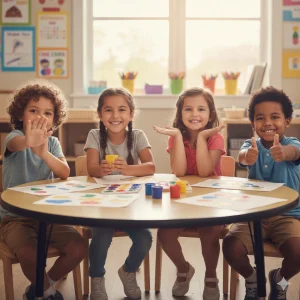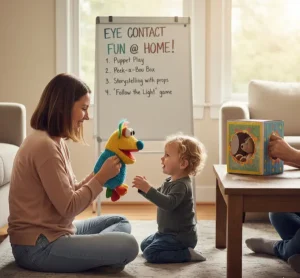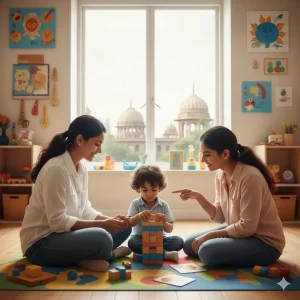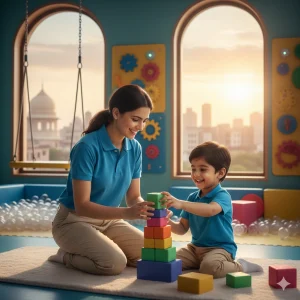Building Bridges in Love: How to Strengthen Intercultural Bonds
By Prapoorna M
Last Updated: February 26, 2024
In a world that’s more connected than ever, the tapestry of love and relationships has evolved to embrace a beautiful spectrum of diversity. Intercultural relationships, a once-rare occurrence, are now flourishing in this globalized society, painting a vivid picture of love that transcends geographic and cultural boundaries. These unions are not just about the coming together of two people, but the merging of distinct cultures, traditions, and worldviews.
The journey of an intercultural relationship, however, is a unique blend of challenges and joys. It’s a path that demands an open heart and mind, where cultural differences become opportunities for growth and deepening bonds. These relationships are classrooms where patience, empathy, and understanding are both taught and learned daily.
Also Read: Ways for Effective and Positive relationships at the Workplace
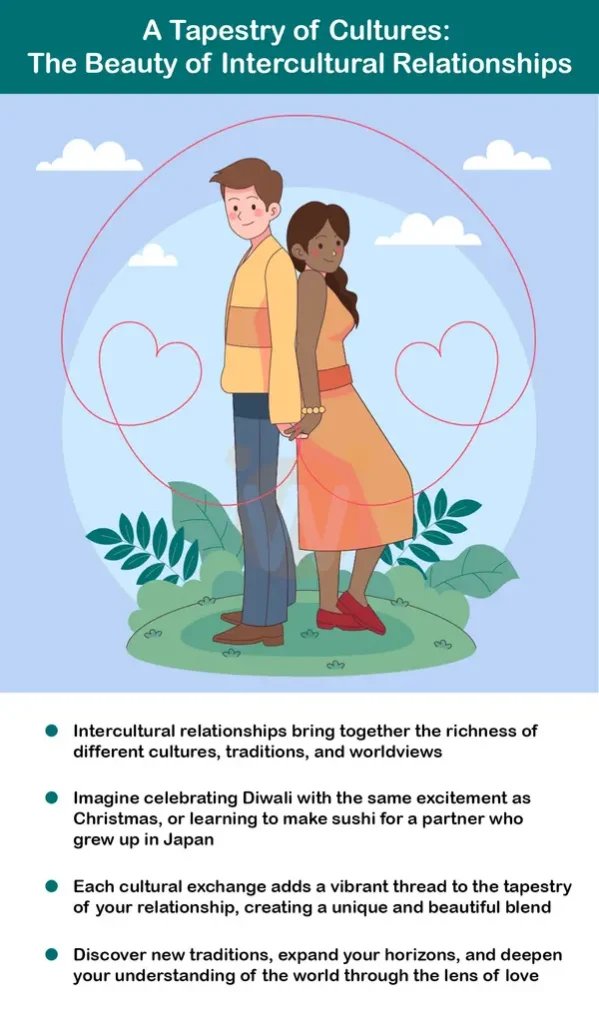
The Beauty of Cultural Diversity in Intercultural Relationships
When two people from different cultural backgrounds come together, they don’t just share interests or hobbies; they share entire worlds. This fusion, inherent in intercultural relationships, brings a richness that is both exhilarating and enlightening. It’s about discovering the beauty in our differences and learning that love, in its essence, is a universal language.
Imagine celebrating Diwali with the same excitement as Christmas, or learning to make sushi for a partner who grew up in Japan. It’s in these moments that we see the beauty of cultural exchange. Each tradition, each story shared, adds a vibrant thread to the tapestry of your relationship, making it richer and more colorful.
But it’s not just about the festive celebrations or the exotic cuisines. It’s also about mutual respect and understanding. Recognizing and honoring each other’s cultural norms and values plays a significant role in strengthening the bond. This respect isn’t just about tolerating differences, but about genuinely appreciating what makes each other unique.
As we delve into the richness of different cultures, understanding our emotional and mental health becomes key.
Common Challenges in Intercultural Relationships
| Challenge | Description | Placement in Article |
|---|---|---|
| Cultural Differences | Partners may have different customs, beliefs, values, and ways of communicating. This can lead to misunderstandings, disagreements, and frustration. | Early in the article, where you discuss the complexities of intercultural relationships. |
| Language Barriers | Partners may not speak the same language fluently or understand each other’s cultural nuances in communication. This can make it difficult to express feelings, understand jokes, and have deep conversations. | In the section dedicated to communication tips for intercultural couples, alongside strategies for overcoming language barriers. |
| Family Expectations | Partners’ families may have different expectations for the relationship, including wedding rituals, roles within the family, and lifestyle choices. This can cause tension and conflict, especially if families are not supportive of the relationship. | In the section discussing navigating challenges together, with suggestions for open communication and finding common ground with families. |
| Bureaucratic Hurdles | Intercultural couples may face challenges with visas, residency permits, and citizenship, especially if they come from different countries with complex immigration processes. This can be stressful, time-consuming, and expensive. | In the section discussing practical challenges, alongside tips for staying informed, organized, and seeking guidance from relevant authorities. |
| Financial Disparity | Partners may have different financial backgrounds and expectations, leading to disagreements about budgeting, spending habits, and financial goals. | In the section discussing practical challenges, alongside tips for open communication and compromise on financial matters. |
| Religious Differences | Partners may have different religious beliefs and practices, which can cause conflict if not discussed and navigated carefully. | In the section discussing cultural differences, emphasizing the importance of respectful dialogue and finding common ground in values, even if beliefs differ. |
| Social Integration | Integrating into each other’s social circles and communities can be challenging, especially if there are cultural or language barriers. | In the section discussing navigating challenges together, with suggestions for finding common interests, being open to new experiences, and building supportive social networks. |
Communication: The Bridge Over Cultural Gaps
Communication in intercultural marriages is much like crossing a bridge between two worlds. It’s about more than just words; it’s about understanding and interpreting the unspoken, cultural nuances that add layers of complexity to every conversation.
Language barriers, while challenging, are just the tip of the iceberg. Effective communication in a diverse relationship setting involves patience, active listening, and a willingness to learn. It’s about finding common ground where there seems to be none, about turning misunderstandings into opportunities for deeper understanding.
Here are some practical tips to enhance communication in your intercultural relationship:
- Embrace Patience: Language barriers can lead to frustration. Remember, it’s not about how quickly you understand, but how well.
- Active Listening: This means really hearing your partner, not just their words, but also their unspoken thoughts and feelings.
- Learn and Use Their Language: Even basic knowledge of your partner’s language can go a long way in showing your commitment and respect for their culture.
- Cultural Sensitivity: Be aware of cultural nuances in communication styles. What is considered polite in one culture might be seen as distant in another.
- Non-Verbal Cues: Pay attention to body language and facial expressions, they often convey more than words.
- Seek Clarification: If you’re unsure about what your partner means, ask. It’s better to clarify than to assume.
Remember, at the heart of every successful intercultural relationship is a bridge of communication, built with patience, understanding, and respect. Crossing this bridge may not always be easy, but the journey and the connection it fosters are well worth the effort.
Navigating Challenges Together in Intercultural Relationships
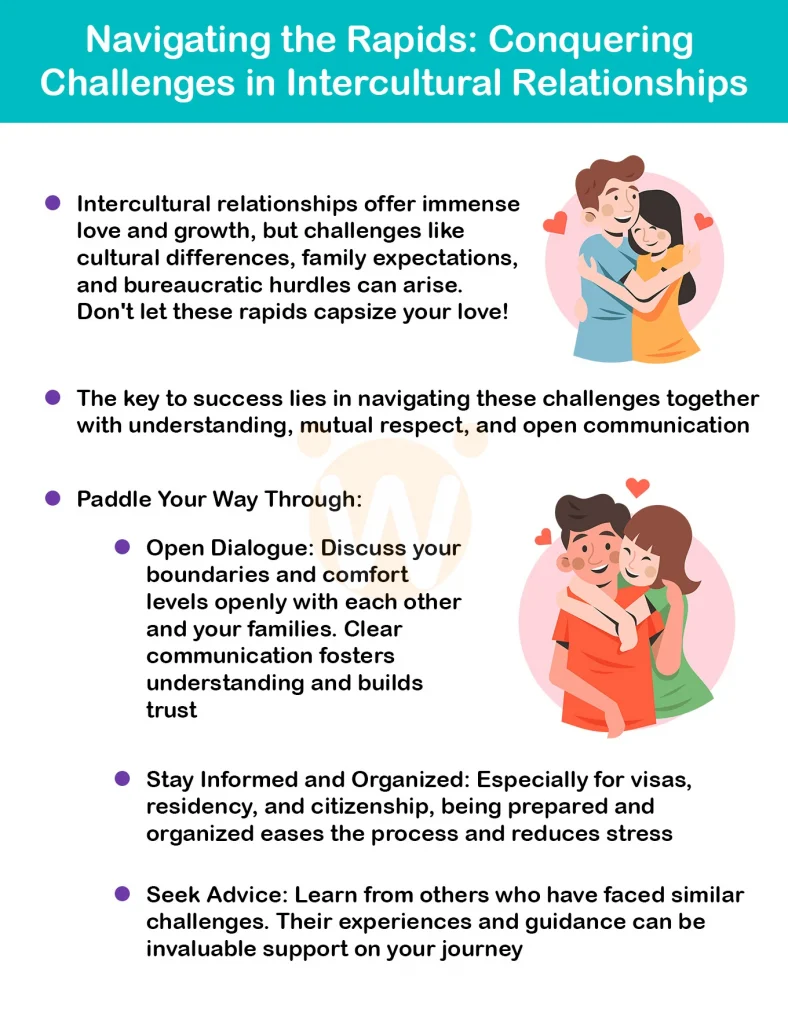
Embarking on an intercultural relationship is akin to setting sail on a vast ocean. The journey is exciting and full of discovery, but not without its challenges. Differing cultural norms, family expectations, and bureaucratic hurdles often test the resilience of these unions. However, where there are challenges, there are also solutions, and the strength of a relationship is often built on overcoming these together.
Also Read: How to Identify your Stress? Know your Eustress and Distress
A Common Challenge:
One partner’s family might have different expectations for the relationship, ranging from wedding rituals to lifestyle choices. It’s like navigating a boat through uncharted waters, where each wave represents a different cultural norm or expectation. The key is to steer with understanding and mutual respect.
Solution:
Open dialogue is crucial. Couples should discuss their boundaries and comfort levels and communicate these with their families. It’s about finding a balance, a middle path that respects both cultures. A quote by Kahlil Gibran beautifully encapsulates this: “Let there be spaces in your togetherness.”
Also Read: Online Marital Counselling
Bureaucratic Challenges:
Navigating the bureaucratic seas of visas, residency, and citizenship can be daunting. It’s a journey that demands patience and often, a good sense of humor.
Solution:
Staying informed and organized is vital. Keeping a checklist of required documents, deadlines, and legal requirements can make the process smoother. Seeking advice from those who’ve successfully navigated these waters can be invaluable.
Key Challenges and Solutions in Intercultural Relationships
| Challenge | Solution |
|---|---|
| Different Cultural Norms | Open Dialogue and Cultural Education |
| Understanding and respecting the unique cultural practices and beliefs of each partner. | Engaging in regular, open conversations about each culture’s norms and educating oneself about the partner’s cultural background to foster understanding and respect. |
| Family Expectations | Family Inclusion and Compromise |
| Balancing the differing expectations and traditions of each partner’s family. | Including family members in discussions, seeking their perspectives, and finding a middle ground that respects both cultures. |
| Bureaucratic Hurdles | Staying Informed and Organized |
| Navigating immigration, visas, and citizenship issues in a cross-cultural setting. | Keeping track of necessary documents, deadlines, and legal requirements; seeking advice from experts or those with similar experiences. |
| Language Barriers | Language Learning and Patience |
| Overcoming difficulties in communication due to different native languages. | Taking steps to learn each other’s languages, however basic, and exercising patience during miscommunications. |
| Different Communication Styles | Cultural Sensitivity and Adaptation |
| Adjusting to varying styles of communication and expression inherent in different cultures. | Being aware of and sensitive to these differences, and adapting one’s own communication style as needed for clearer understanding. |
| Raising Children with Dual Heritage | Inclusive and Balanced Upbringing |
| Deciding how to raise children in a way that honors both cultures. | Integrating aspects of both cultures in the children’s upbringing, ensuring they have a balanced understanding and appreciation of their heritage. |
Celebrating and Integrating Diverse Traditions
One of the most beautiful aspects of cross-cultural relationships is the wealth of traditions and festivals that each partner brings. It’s like having a year-round global festival in your home, where diversity is not just accepted but celebrated.
Creating New Traditions:
While respecting and participating in each other’s cultural festivities, why not start your own unique traditions? This could be as simple as a fusion dinner night every month, where dishes from both cultures are combined, creating something wonderfully new and delicious.
Understanding the significance of festivals and traditions across cultures can enrich your perspective.
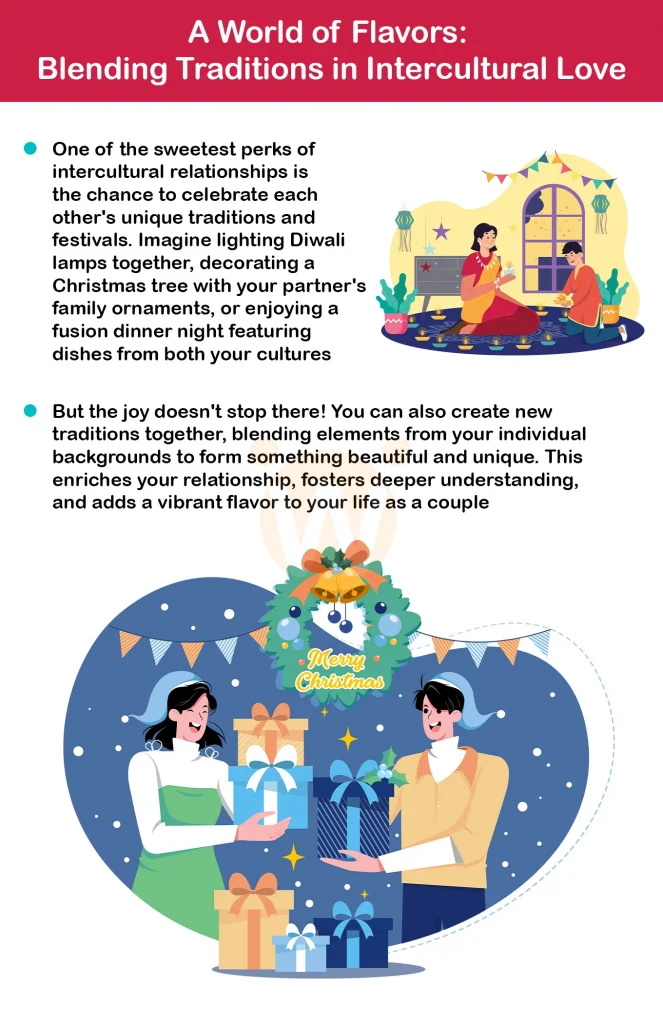
The Journey of Personal Growth in Intercultural Relationships
One of the most enriching aspects of intercultural relationships is the remarkable journey of personal growth they ignite. It’s a path where ‘How do intercultural relationships work?’ evolves into ‘How have these relationships transformed me?’. Embracing a partner from a different culture not only opens doors to new experiences but also fosters profound personal development.
Personal growth mirrors the journey in therapy, where self-discovery and improvement are central themes.
The heart of this growth lies in the development of empathy. Empathy goes beyond mere understanding; it’s about feeling with someone. In intercultural relationships, you learn to perceive the world through your partner’s eyes. This deeper emotional connection helps dissolve cultural barriers, fostering a bond that transcends traditional relationship dynamics.
Open-mindedness is another gift of these relationships. When you embrace a culture different from your own, you challenge your beliefs and biases. It’s a learning curve, but one that expands your horizons, making you more receptive to new ideas and perspectives.
Understanding, too, grows in leaps and bounds. It’s about more than just understanding why your partner celebrates certain festivals or prefers certain foods. It’s about understanding the deeper cultural significances that shape their worldview.
Personal growth in relationships, especially intercultural ones, is akin to understanding oneself better.
Building a Foundation of Shared Values and Beliefs
For international couples, finding common ground in core values and beliefs is like building a bridge between two worlds. It’s a crucial part of creating a strong, sustainable relationship.
The key lies in communication and mutual respect. Discuss your values and beliefs openly. It’s not about agreeing on everything, but about understanding and respecting each other’s viewpoints. It’s a dialogue, not a debate.
One practical approach is to identify values that are important to both of you. Is it family? Honesty? Compassion? These shared values become the bedrock of your relationship, a common language in a world of differences.
Also Read: For more on nurturing values and beliefs in relationships, our article offers further guidance.
The Joy of Raising a Global Family
One of the heartwarming success stories of international couples is the unique experience of raising a global family. In a multicultural environment, children grow up with a rich blend of cultures, languages, and worldviews, preparing them to become compassionate citizens of the world.
In these households, bilingual or multilingual upbringing is not just a trend; it’s a way of life. The benefits of growing up speaking multiple languages extend far beyond communication. It fosters cognitive flexibility, enhances problem-solving skills, and deepens cultural empathy. Children learn to switch between languages seamlessly, a skill that reflects the adaptability and openness of their minds.
Take, for example, the story of Maya and Tom, an Indian-American couple. Their children, Aarav and Sophia, have been raised speaking both Hindi and English. This bilingual environment has not only strengthened their connection to both cultures but has also given them a distinct advantage in their education and social interactions. Their ability to understand and appreciate different perspectives is profound, a direct result of their diverse upbringing.
Benefits of a Multicultural Family Environment
| Benefit | Description |
|---|---|
| Bilingualism | Children growing up in a multicultural family often learn to speak multiple languages fluently. This skill enhances their communication abilities and broadens their cultural understanding. It also provides cognitive benefits such as improved memory and problem-solving skills. |
| Cognitive Flexibility | Exposure to multiple cultures enhances cognitive flexibility, allowing children to adapt to changing environments and think in more complex, creative ways. This skill is beneficial in problem-solving and learning. |
| Cultural Empathy | Being exposed to diverse cultural perspectives from a young age fosters a deep sense of empathy and understanding towards people from different backgrounds. This empathy is crucial in developing social skills and global awareness. |
| Broader Worldview | Children in multicultural families gain a broader perspective of the world, understanding that there are multiple ways of living and thinking, which enhances their ability to navigate a globalized society. |
| Adaptability and Resilience | Growing up in a multicultural environment teaches children to be adaptable and resilient in the face of new situations and challenges, as they are accustomed to encountering and embracing differences. |
| Appreciation of Diversity | These children often develop a strong appreciation for cultural diversity and, an understanding the value of different traditions, languages, and perspectives, which contributes to a more inclusive and harmonious society. |
| Enhanced Communication Skills | Multicultural environments require nuanced communication, where children learn to express themselves clearly across languages and cultural norms, enhancing their interpersonal and professional communication skills. |
| Stronger Identity and Self-Esteem | Children learn to integrate aspects of multiple cultures into their identity, often resulting in a strong sense of self and high self-esteem, as they take pride in their unique background. |
Raising a global family also means ensuring the best for your children’s development and mental health.
Conclusion
As we journey through the diverse and captivating world of intercultural relationships, we uncover a mosaic of challenges, joys, and profound learning experiences. These relationships, a blend of different cultures, languages, and traditions, are more than just unions between individuals. They are powerful testimonies to the strength of love, understanding, and unity in the face of diversity.
We’ve explored the beauty of cultural diversity, the significance of effective communication, and the enriching experience of navigating challenges together. We’ve celebrated the joys of integrating diverse traditions and the personal growth that comes from such unions. And we’ve seen the extraordinary opportunity of raising global-minded children in a multicultural environment.
As we embrace love across cultures, remember that maintaining a healthy relationship is key to its success.
As we conclude this exploration, we at Wellness Hub encourage you to continue embracing the richness of intercultural relationships. Whether you are in such a relationship, considering one, or simply intrigued by the concept, remember that love knows no borders. It’s about understanding, adapting, and growing together.
We invite you to visit Wellness Hub for more insights, support, and resources on nurturing your intercultural relationship. Let’s celebrate love in all its beautiful diversity.
Frequently Asked Questions
1. What are the main challenges in intercultural relationships?
The main challenges often include navigating cultural differences, managing language barriers, aligning different family expectations, and dealing with bureaucratic processes for international couples. Overcoming these challenges requires effective communication, empathy, and mutual respect for each other’s cultures.
2. How can couples in intercultural relationships improve their communication?
Couples can enhance communication by practicing active listening, learning each other’s languages, being patient with language barriers, and understanding the cultural nuances behind communication styles. It’s also helpful to use translation tools and engage in regular, open dialogues about their feelings and perspectives.
3. What are the benefits of raising children in a multicultural environment?
Children raised in multicultural environments often develop bilingual or multilingual skills, exhibit greater cultural empathy, and have a broader understanding of the world. They tend to be more adaptable, and open-minded and possess a unique ability to appreciate diversity
4. How can intercultural couples navigate differences in family expectations and traditions?
Intercultural couples can navigate these differences by discussing their own beliefs and traditions openly, finding common ground, and creating new traditions that honor both cultures. Mutual respect and compromise are key in integrating diverse family expectations and practices.
5. Can intercultural relationships lead to personal growth?
Yes, intercultural relationships often lead to significant personal growth. Individuals in these relationships usually develop a deeper level of empathy, open-mindedness, and a greater understanding of different cultural perspectives, enriching their personal and relational development.
6. Where can I find more resources and support for my intercultural relationship?
For more resources and support on intercultural relationships, you can visit Wellness Hub. Our platform offers insightful articles, expert advice, and a supportive community to help you navigate the complexities and joys of your intercultural relationship.
7. What are effective strategies for overcoming cultural differences in intercultural relationships?
Effective strategies include embracing each other’s cultures with an open mind, engaging in frequent and honest communication, practicing empathy, and educating oneself about the partner’s cultural background. It’s also beneficial to participate in each other’s cultural events and traditions to build a deeper understanding and appreciation.
8. How can language barriers be addressed in intercultural marriages?
Overcoming language barriers in intercultural marriages involves patience and effort from both partners. Learning each other’s languages, even the basics, can significantly improve communication. Utilizing language learning apps, and translation tools, and engaging in regular language exchange sessions are practical steps couples can take.
9. What are the advantages of raising children in a bilingual or multilingual environment?
Children raised in bilingual or multilingual environments often develop advanced cognitive skills, better problem-solving abilities, and a heightened cultural awareness. They are likely to have improved memory, and enhanced creativity, and find it easier to learn additional languages in the future.
10. How can intercultural couples effectively blend different family traditions and customs?
Intercultural couples can blend family traditions by creating a respectful and inclusive environment where both cultures are valued equally. This can be achieved by alternating or combining cultural celebrations, creating new traditions that incorporate elements from both backgrounds and maintaining open communication about each partner’s cultural preferences and expectations.
About the Author:
Prapoorna Mangalampalli
M.Sc., M.A., (Dual Masters in Psychology & English) – Counselor (6+ years of experience)
Prapoorna armed with a passionate dedication fueled by dual Master’s degrees in Psychology and English, Prapoorna sheds light on and elevates human experiences. Over 6+ years of experience fuel her insightful approach to counseling, offering profound empathy and guidance across diverse areas like online, marital, relationship, child, family, and career counseling.
At Wellness Hub, she thrives in a team environment that values innovation, compassion, and achieving results for their clients.
Connect with Prapoorna to learn how she can help you or your loved one find their voice and build a brighter future.
Book your Free Consultation Today
Parent/Caregiver Info:
Client’s Details:
* Error Message
